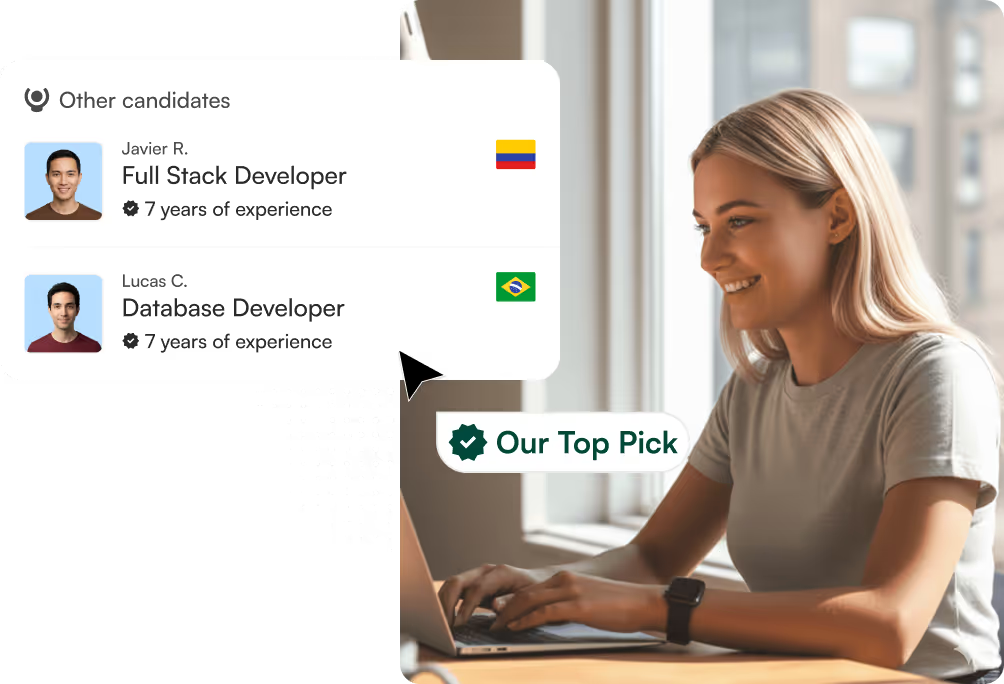30 Unique Interview Questions to Ask Employers to Stand Out


Lupa will help you hire top talent in Latin America.
Book a Free Consultation
Lupa helps you build, manage, and pay your remote team. We deliver pre-vetted candidates within a week!
Book a Free ConsultationJob interviews aren't just about impressing potential employers—they're a two-way street where you evaluate if the company is the right fit for your career goals and values. Asking thoughtful, unique interview questions to ask employers demonstrates your preparation, critical thinking skills, and genuine interest in the position. It shows you're not just looking for any job, but the right job.
Strategic questions provide valuable insights about the role, team dynamics, company culture, and growth opportunities that will help you make informed career decisions. They also help you stand out from other candidates who might ask predictable or generic questions. Remember, the best interview questions can leave a lasting impression on hiring managers and potentially influence their hiring decision.
Why Asking Unique Questions Matters
Asking thoughtful, unique questions during a job interview serves multiple strategic purposes that can significantly impact your candidacy and decision-making process:
Demonstrates genuine interest: Unique, well-researched questions show you're truly interested in the position and company, not just looking for any job. This level of engagement signals to employers that you're serious about the opportunity.
Showcases preparation: Thoughtful questions reflect the research and preparation you've done before the interview. This demonstrates your professionalism and commitment to the process.
Highlights intelligence and critical thinking: The quality and depth of your questions reveal your thought process and ability to think independently—qualities highly valued by employers.
Helps determine fit: Perhaps most importantly, asking unique interview questions to ask employers helps you gather crucial information to determine if the job, team, and company culture align with your career goals, work style, and values.
Employers often use a candidate's questions to evaluate their engagement, curiosity, and alignment with company values. In competitive job markets, where multiple candidates may have similar qualifications, the quality of your questions can be the differentiating factor that sets you apart and influences the hiring decision in your favor.
How to Prepare Your Interview Questions
Preparing effective interview questions requires thoughtful consideration and research. Here's how to develop unique interview questions to ask employers that will help you stand out and gather valuable information:
Research thoroughly: Before your interview, thoroughly research the company by reviewing their website, recent news articles, social media presence, and employee reviews on platforms like Glassdoor. Look for information about their mission, values, products/services, recent achievements, and challenges.
Tailor questions to the role and company: Customize your questions based on the specific position and organization. Consider what information would be most valuable for you to know about this particular role, team, and company culture.
Prepare more questions than needed: Have at least 8-10 questions ready, knowing you may only have time to ask 3-5. Some of your prepared questions might also be answered during the interview, so having extras ensures you won't be left without anything to ask.
Consider timing and context: Some questions are more appropriate for initial interviews, while others are better saved for later stages or when speaking with specific interviewers (like team members vs. HR representatives).
Use open-ended questions: Frame questions that encourage detailed responses rather than simple yes/no answers. This provides richer information and creates more meaningful conversation.
Take notes during the interview: Bring a notebook to jot down key points during the interview, which can help you formulate follow-up questions based on the conversation.
By investing time in preparing thoughtful questions, you position yourself as a serious, engaged candidate while gathering the information you need to make an informed decision about your next career move.
Questions About the Role and Expectations
1. "What does success look like in this role after 30, 60, and 90 days?"
This question helps you understand immediate expectations and priorities for the position. The answer reveals whether the company has clear objectives for the role or if expectations are ambiguous. A detailed response indicates the organization has thoughtfully considered the onboarding process and has specific goals in mind, while a vague answer might suggest undefined expectations.
By asking this, you demonstrate a results-oriented mindset and your desire to meet or exceed expectations from the start. It also helps you evaluate if the expectations align with your skills and experience, giving you a realistic preview of what your first three months might look like.
2. "What are the biggest challenges someone in this position might face in the first six months?"
This question uncovers potential obstacles you might encounter and helps you prepare accordingly. The answer provides insight into the role's complexity and the employer's transparency about difficulties. A candid response about challenges demonstrates the company's honesty and realistic expectations.
Asking about challenges shows your readiness to tackle difficult situations and your desire for a realistic job preview. It also gives you the opportunity to address how your experience and skills have prepared you to handle these specific challenges, further strengthening your candidacy.
3. "How has this role evolved since it was created?"
This question reveals the position's history and potential future trajectory. The answer indicates whether the role is well-established with clear boundaries or still being defined and shaped. It can also provide insights into how the company adapts positions based on business needs or the strengths of individuals in the role.
By asking this, you demonstrate interest in the role's development and your adaptability to changing responsibilities. Understanding how the position has evolved helps you assess whether it offers the kind of growth and development opportunities you're seeking in your career.
4. "What tasks or responsibilities might I encounter that aren't mentioned in the job description?"
This question uncovers hidden aspects of the role that may not have been formally documented. The answer provides a more complete picture of daily responsibilities and expectations beyond what was listed in the job posting. It can reveal additional skills you might need or opportunities you hadn't considered.
Asking this shows your thoroughness and desire to understand the full scope of the position. It also helps you avoid surprises after accepting the job and ensures you have a comprehensive understanding of what will be expected of you.
5. "How will my performance be measured and evaluated in this role?"
This question clarifies success metrics and evaluation processes. The answer reveals the company's performance management approach and transparency about expectations. Understanding the key performance indicators (KPIs) for the role helps you focus your efforts on what matters most to the organization.
By asking about performance measurement, you demonstrate your results-orientation and desire for clear feedback. It also helps you assess whether the company's evaluation methods align with your work style and preferences.
6. "How does this position contribute to the company's overall goals and mission?"
This good question connects the role to broader organizational objectives. The answer indicates whether the position is valued and integrated into company strategy or potentially siloed. Understanding how your work would impact the organization's success helps you see the bigger picture and the importance of your potential contribution.
Asking this shows your big-picture thinking and desire to make meaningful contributions beyond just completing tasks. It demonstrates that you want to align your work with the company's mission and be part of something larger than just your individual role, making you a good fit.
Questions About Team Dynamics and Collaboration
7. "Can you describe the team I'll be working with and how we would collaborate?"
This question provides insight into team structure and working relationships. The answer reveals team size, roles, and collaboration styles, helping you understand the day-to-day work environment. It can also indicate whether the team works closely together or more independently.
By asking about team dynamics, you demonstrate your teamwork orientation and interest in workplace relationships. This information helps you assess whether the team environment matches your preferred work style and if you'll have the support and collaboration you need to succeed.
8. "What skills or attributes are currently missing from the team that you hope I can bring?"
This question identifies the employer's specific needs and expectations beyond the job description. The answer reveals priorities and potential areas where you can add unique value to the team. It helps you understand exactly why they're hiring and what gap they're trying to fill.
Asking this shows your strategic thinking about your potential contribution and your focus on adding value. It also gives you the opportunity to highlight how your specific skills and experiences align with their needs, strengthening your candidacy.
9. "How do team members typically communicate and share information?"
This question uncovers communication practices and tools used within the team and organization. The answer indicates the company's approach to transparency, collaboration, and information sharing. It reveals whether communication is primarily formal or informal, frequent or limited, in-person or digital.
By asking the recruiter about communication practices, you demonstrate awareness of communication's importance in workplace success. This information helps you assess whether their communication style matches your preferences and needs, particularly important in remote work or hybrid work environments.
10. "What are the biggest challenges your team is currently facing?"
This question reveals current priorities and potential areas where you could contribute solutions. The answer provides insight into team dynamics, organizational challenges, and immediate needs. It helps you understand what problems you might help solve if hired.
Asking about team challenges demonstrates your problem-solving orientation and desire to contribute meaningfully from the start. It also helps you evaluate whether the challenges align with your skills and interests, and whether you'd find the work engaging.
11. "How does the team handle disagreements or conflicts?"
This question uncovers conflict resolution approaches and team culture. The answer indicates the company's maturity in handling difficult situations and whether diverse perspectives are valued. It reveals whether the team environment is psychologically safe for expressing differing opinions.
By asking the recruiter about conflict resolution, you demonstrate emotional intelligence and interest in healthy workplace dynamics. This information helps you assess whether the team's approach to disagreement aligns with your values and whether you'd feel comfortable in their environment.
Questions About Company Culture and Values
12. "How would you describe the company culture in three words?"
This question efficiently captures cultural essence by forcing brevity. The answer's conciseness can reveal core values and workplace atmosphere without corporate jargon. The specific words chosen often highlight what the company truly values most.
Asking for this simplified description shows your interest in cultural fit and values alignment. It also provides a quick snapshot that you can compare against your own preferred work environment to assess compatibility.
13. "What aspects of the company culture make you proud to work here?"
This question reveals authentic employee sentiment beyond official statements. The answer provides insight into genuine cultural strengths and employee satisfaction from someone experiencing it firsthand. Personal pride points often reveal the true lived experience at the company.
By asking what makes someone proud, you demonstrate interest in positive workplace attributes and employee experience. This personal perspective helps you evaluate whether the aspects that inspire pride in current employees would also be meaningful to you.
14. "How does the company support work-life balance?"
This question addresses an increasingly important workplace concern for many job seekers. The answer reveals policies, practices, and attitudes toward employee wellbeing and life outside work. It can uncover whether work-life balance is merely talked about or actively supported through specific policies.
Asking about work-life balance shows your holistic approach to career advice decisions and self-awareness about sustainability. This information helps you assess whether the company's approach aligns with your needs and priorities for balancing professional and personal life.
15. "How does the company approach diversity, equity, and inclusion?"
This question addresses critical workplace values that impact organizational culture and employee experience. The answer reveals the company's commitment to creating an inclusive environment and whether DEI is a priority or an afterthought. It can uncover specific initiatives, policies, or challenges in this area.
By asking about diversity and inclusion, you demonstrate awareness of important social issues and interest in equitable workplaces. This information helps you evaluate whether the company's values and practices in this area align with your own.
16. "What traditions or events does the company have that strengthen team bonds?"
This question uncovers community-building practices that contribute to workplace culture. The answer provides insight into social aspects of the workplace and company investment in relationships. It reveals whether the organization values connection beyond work tasks.
Asking about traditions and events shows your interest in workplace community and belonging. This information helps you assess whether the social environment would be engaging and fulfilling for you, particularly important if company culture is a priority in your job search.
Questions About Professional Development and Growth
17. "How does the company support professional development and continuous learning?"
This question addresses career growth opportunities and learning culture. The answer reveals the company's investment in employee development through formal programs, mentoring, training budgets, or other resources. It indicates whether skill development is valued or expected to happen independently.
By asking about professional development, you demonstrate a growth mindset and long-term career planning. This information helps you assess whether the company will support your continued learning and advancement, which is crucial for long-term job satisfaction.
18. "Can you share examples of employees who have grown or advanced their careers here?"
This question seeks concrete evidence of career progression possibilities. The answer provides insight into advancement opportunities and whether the company promotes from within. Real examples demonstrate that growth isn't just theoretical but actually happens.
Asking for specific examples shows your ambition and interest in long-term opportunities with the company. This information helps you evaluate whether there's a viable career path that aligns with your goals or if advancement might require changing employers.
19. "What skills have you found essential for advancement in this company?"
This question identifies success factors and company values beyond technical requirements. The answer reveals both technical and soft skills valued by the organization for career growth. It provides insight into what the company truly prioritizes in its leaders and advanced roles.
By asking about advancement skills, you demonstrate strategic thinking about career development. This information helps you assess whether your strengths align with what's needed for growth and what skills you might need to develop to progress within the organization.
20. "How are employees recognized and rewarded for exceptional work?"
This question uncovers recognition practices and motivation approaches. The answer reveals the company's values and appreciation culture, whether through formal programs, financial incentives, or other forms of acknowledgment. It indicates whether contribution is noticed and valued.
Asking about recognition shows your interest in positive reinforcement and achievement acknowledgment. This information helps you understand how your contributions would be valued and whether the reward systems align with what motivates you.
21. "What learning resources or educational benefits does the company provide?"
This question addresses specific development opportunities and benefits. The answer reveals the company's investment in employee education through tuition reimbursement, learning platforms, conference budgets, or other resources. It provides concrete examples of how learning is supported.
By asking about learning resources, you demonstrate interest in continuous improvement and value of education. This information helps you assess whether the company provides the tools and support you need to continue developing your skills and knowledge.
Questions About Leadership and Management
22. "How would you describe your leadership or management style?"
This question provides insight into the supervisor's approach and what it might be like to report to them. The answer reveals communication preferences, autonomy levels, and feedback styles you can expect. It helps you understand how hands-on or hands-off your potential manager would be.
Asking about management style shows self-awareness about what type of leadership works best for you. This information helps you assess whether their approach aligns with how you work best and whether you'd thrive under their management.
23. "What qualities do you value most in the people who report to you?"
This question identifies expectations and success factors from the manager's perspective. The answer reveals priorities and values that may not appear in formal job descriptions but are important for a strong working relationship. It provides insight into how to excel under this particular leader.
By asking what a manager values, you demonstrate interest in meeting or exceeding their expectations. This information helps you evaluate whether your working style and strengths align with what this manager appreciates most in team members.
24. "How does senior leadership communicate company updates and strategic decisions?"
This question addresses transparency and information flow throughout the organization. The answer reveals organizational communication culture and leadership accessibility. It indicates whether employees are kept informed about important developments or left in the dark.
Asking about leadership communication shows your interest in organizational clarity and inclusion in the bigger picture. This information helps you assess whether the company's communication approach would provide the level of transparency and inclusion you desire.
25. "What's the most common reason people leave this company?"
This question tactfully addresses potential issues or red flags. The answer reveals organizational self-awareness and transparency about challenges. A candid response demonstrates honesty, while evasiveness might indicate problems the company is unwilling to acknowledge.
By asking about turnover reasons, you demonstrate due diligence and interest in making an informed decision. This information helps you identify potential concerns that might affect your own satisfaction and longevity with the company.
Questions About Company Direction and Future
26. "What are the company's biggest priorities or challenges in the next 1-3 years?"
This question addresses strategic direction and future focus. The answer reveals organizational priorities and potential areas where you could make meaningful contributions. It provides insight into whether the company is in growth mode, maintenance mode, or facing significant challenges.
Asking about future priorities shows your forward-thinking and interest in the company's trajectory. This information helps you assess whether the organization's direction aligns with your interests and where you might fit into their future plans.
27. "How has the company evolved since you joined, and what changes do you anticipate?"
This question provides historical context and future outlook from someone with firsthand experience. The answer reveals organizational adaptability and strategic planning from a personal perspective. It offers insight into the pace and nature of change within the company.
By asking about evolution and anticipated changes, you demonstrate interest in the company's journey and adaptability to change. This information helps you evaluate whether the organization's trajectory seems positive and whether you'd thrive in their changing environment.
28. "What gives this company its competitive advantage in the industry?"
This question addresses market positioning and organizational strengths. The answer reveals what the company believes sets it apart from competitors and its value proposition. It provides insight into what the organization prides itself on and how it positions itself in the market.
Asking about competitive advantage shows your business acumen and strategic thinking. This information helps you understand the company's place in the industry and whether their differentiators align with what you value in an employer.
29. "How has the company adapted to recent industry or technological changes?"
This question addresses adaptability and innovation in response to external factors. The answer reveals organizational agility and approach to change, particularly important in rapidly evolving industries. It indicates whether the company is forward-thinking or resistant to change.
By asking about adaptation to change, you demonstrate awareness of industry trends and interest in forward-thinking organizations. This information helps you assess whether the company is likely to remain competitive and innovative in a changing landscape.
30. "What makes you optimistic about the company's future?"
This question ends on a positive, forward-looking note that invites personal perspective, ideal for the end of an interview. The answer reveals genuine enthusiasm and confidence in the organization's direction. It provides insight into morale and outlook from someone inside the company.
Asking about optimism shows your positive outlook and interest in joining a promising team. This information helps you gauge the level of confidence and excitement current employees feel about the company's future, which can be a good indicator of organizational health.
Tips for Asking Your Questions Effectively
Having great unique interview questions to ask employers is only half the equation—how you ask them matters too. Here are practical tips for delivering your questions effectively during job interviews:
Time your questions appropriately: Save most of your questions for when the interviewer invites them, typically toward the end of the interview. However, if a natural opportunity arises during the conversation to ask a relevant question, take it—this creates a more engaging dialogue.
Maintain a conversational tone: Frame your questions as part of a natural conversation rather than reading from a list. This creates a more engaging exchange and demonstrates your interpersonal skills.
Listen actively to responses: Show genuine interest in the answers by maintaining eye contact, nodding, and providing brief verbal acknowledgments. This demonstrates your engagement and communication skills.
Ask follow-up questions when appropriate: When an answer sparks additional curiosity or needs clarification, don't hesitate to ask a relevant follow-up question. This shows you're actively processing the information and engaged in the conversation.
Take brief notes: Jotting down key points from responses shows you value the information and plan to consider it in your decision-making. Just be sure to maintain eye contact and engagement while doing so.
Adapt based on the interview: If some of your prepared questions have already been answered during the interview, acknowledge this and move to other questions. This shows you were paying attention throughout the conversation.
Be authentic: Ask questions you genuinely want answers to, not just those you think will impress the interviewer. Authentic curiosity comes across more positively than performative questioning.
Express appreciation for insights: Thank the interviewer for their thoughtful responses to show professionalism and courtesy.
Remember that the question portion of the interview is your opportunity to evaluate the company and role while continuing to make a positive impression. Approaching it with genuine curiosity and professionalism can strengthen your candidacy while providing valuable information for your decision-making process.
Ready to Stand Out in Your Next Interview?
At Lupa, we understand that finding the right career fit goes beyond just landing any job—it's about finding opportunities where you can truly thrive. Our team specializes in connecting talented professionals with companies that value thoughtful, engaged candidates who ask the right questions.
Ready to find opportunities where your interview skills can shine? Connect with Lupa today and discover how our relationship-focused approach to recruiting can help you find your next great career move.

"Over the course of 2024, we successfully hired 9 exceptional team members through Lupa, spanning mid-level to senior roles. The quality of talent has been outstanding, and we’ve been able to achieve payroll cost savings while bringing great professionals onto our team. We're very happy with the consultation and attention they've provided us."


“We needed to scale a new team quickly - with top talent. Lupa helped us build a great process, delivered great candidates quickly, and had impeccable service”


“With Lupa, we rebuilt our entire tech team in less than a month. We’re spending half as much on talent. Ten out of ten”






















